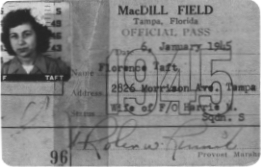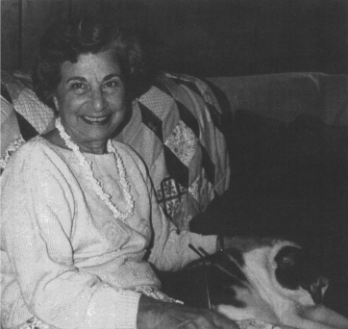




Florence V. Taft is a bubbly, friendly woman, who is very comfortable to be around.
I was going to college at the time the war began, but left in my junior year to marry my boyfriend who I had been going with since I was 16. He was an aviation cadet in the Air Corps in Douglas, Arizona.
I was taking a train out there with my sister to meet him, which at that time would take six days. The trains were always jam-packed. Sometimes there wasn't even a place to sit on the floor. They were cold, too, and you had to use newspapers for warmth.
Because of the overcrowding, we ran into a problem in El Paso, Texas. The train wouldn't take us any further. We were told to get off and to come back the next day around six in the morning and they'd see what they could do. We finally had to ride in a troop train with thousands and thousands of guys and only about six girls. Because of this delay, I was a day late for our wedding and my husband's time was almost up. So, as soon as I arrived we went to a Traveler's Aide and he told us to go to the county seat for a license, which cost 50 cents.
When we got back to Douglas, we went to a chapel and were married by the chaplain with my sister, my husband's friend, and two other people watching. I didn't even have time to change for the wedding, so I had to wear an old cotton dress and we used makeshift rings. As soon as that was over, my husband went back to the base and I went back to a room that I had rented.
I eventually got a job at the base working at the officers club. My husband didn't like that at first, because in those days guys didn't want the girls to work. But then all his buddies would come and I would make the milk shakes with a lot of ice cream and stuff, so I guess it was okay.
Anyway, from there we went to Las Vegas, Nevada for four months, and then he went down to Tampa, Florida, where we were for another three months. After Florida, we went to Georgia. That was the shipping out place. My husband was with the Eighth Air Corps and was a B-17 bomber pilot in England. I went back to Rhode Island. Rather than resume college, I got a job at a plumbing supply company where I kept the files and did the ordering.
It was tough having your husband overseas because, as a young bride, you would hear, "And the Eighth Air Force lost X number of planes today." I can remember hearing that and thinking, "Oh, my God." So, that's when it started to get bad because they lost an awful lot of pilots and their crews. A lot of his friends lost their lives. At the beginning the war was a lark, it was exciting, but not all of the time.
Things were a lot harder to come by during the war. They handed out ration cards where you had to tear out little stamps to buy food. Nylons were extremely hard to come by. I can remember during the war, standing in line for hours to get one pair of nylons because they had just started making them. They had been making silk and what they called lyle, which was a fine cotton. I finally got a pair of nylons, though, and they lasted my for five months. Gasoline was rationed, too. Whenever we came to hills, we would take our foot off the gas and coast down.
I was working in downtown Providence the day the war ended. Everybody was let out at work, and everybody flocked into downtown Providence. All the soldiers and sailors around were kissing everybody, and everyone was yelling and screaming. Downtown Providence was very joyous. Everybody was very, very excited. Very proud.
I think that the Hiroshima and Nagasaki bombing was awful, though. Of course, everybody at the time was saying, "Well, isn't it marvelous? Look at all the lives we saved because we came to such a sharp closing of the war. It ended it!" But, I don't feel good about it. I don't think that we realized how devastating it was. I feel as though it was a world scale, and we were the ones who did it.
Once the war ended, my husband started on mercy missions. In other words, in all these places which had been devastated, the B-17's dropped parcels down to them -- where they were without food or anything.
When my husband came back to Rhode Island, he decided to go back to college, so he was one of the thousands and thousands who got onto the GI Bill . He went to Rhode Island State College (down at URI), and we lived in a place in Lafayette, which is about ten miles from the college, with an outside bathroom. We were getting $100 a month. That was the stipend for the family. Of course, his books and everything were paid for. From there he went on to graduate school and got his Ph.D.
I don't think that I would have really done anything differently if there hadn't been a war. Oh, except for one thing. I would have finished my education -- I would not have rushed into marriage as quickly as I did. I left in my junior year, and it was years before I could go back. That I could have done differently. But, I was being true blue. Looking back, you think, "Oh, I could have waited."
I think that I've been fortunate to have lived through something like the war, because I think many people will never have the experience of that much patriotism, of thinking together, of being together, and wanting to help. It may never be that way again, and I think that was an experience.
Copyright 1995